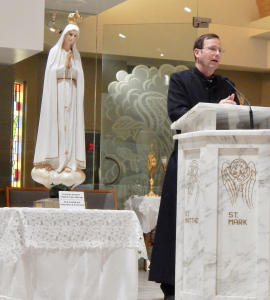
Not a recorded word from his mouth in all of Sacred Scripture, hidden inconspicuously in the background, nonetheless
most dear to God, the loving spouse of Mary, and the Foster-father of Jesus, the Son of the eternal Father—who is this figure? It is SAINT JOSEPH. The Church honors good St. Joseph in theology writings with the title– PROTODULIA— meaning the very first to be honored among all of the saints. This great man of God was both the husband of Mary and at the same time the foster-father of the Son of God. This greatest of all the saints can help us to welcome the Child Jesus into the world on His Birthday. Indeed Saint Joseph can teach us invaluable lessons
most dear to God, the loving spouse of Mary, and the Foster-father of Jesus, the Son of the eternal Father—who is this figure? It is SAINT JOSEPH. The Church honors good St. Joseph in theology writings with the title– PROTODULIA— meaning the very first to be honored among all of the saints. This great man of God was both the husband of Mary and at the same time the foster-father of the Son of God. This greatest of all the saints can help us to welcome the Child Jesus into the world on His Birthday. Indeed Saint Joseph can teach us invaluable lessons
1. SILENCE. Sacred Scripture has not even one word recorded of good Saint Joseph. However, this silence eloquently speaks an infinite abyss. By St. Joseph’s silence he is teaching the world that to be capable of hearing God speak to us we must have silence. God spoke to the Prophet Elijah on the mountain not in the earthquake, not strong wind, nor even
in the storm clouds! No! God spoke to this great Prophet in silence. For this reason we sing the Christmas hymn Silent Night, so that in the silence of the night God can speak to our hearts.
2. PRAYER. St. Teresa of Avila, the Doctor of prayer, gives this sublime title to good Saint Joseph: MASTER OF THE INTERIOR LIFE! Actually the Catechism of the Catholic Church also calls the Holy Spirit the MASTER OF THE INTERIOR LIFE. What actually does this title mean? Simple and to the point it means that St. Joseph, and even more important the Holy Spirit, can teach us how to pray. Extraordinary as this might seem to you: St. Joseph actually taught Jesus to pray. Jesus learned to call God the Father Abba through the teaching of St. Joseph. Jesus learned the Psalms through the instruction of St. Joseph. Jesus was brought to both the synagogue every Saturday and the Temple in Jerusalem the major Feast days being led by the good Saint Joseph. Therefore, if Jesus learned to pray under the direction of St. Joseph, so can we!
3. FORTITUDE AND LOVE. St. Joseph loved much and he suffered much. His two greatest loves were his spouse and his Son, the Lord Jesus. His suffering for them was both constant and intense. He accepted Mary after learning the means by which she became pregnant. He travelled with the pregnant Mary who was most likely on a donkey from Nazareth to Bethlehem. He accepted the humiliation of rejection hearing the words: There is no room for you in the Inn. Then good St. Joseph rose early and fled to Egypt so as to save the Child from being mercilessly massacred by the wicked King Herod. Finally when the Child Jesus was 12 years old, St. Joseph suffered the loss of Jesus for three long days, most likely interiorly blaming himself as guilty of the loss of the Child. In all of this suffering good St. Joseph never became angry, bitter, disheartened or discouraged. Rather, he suffered willingly and totally for Jesus and Mary because he recognized God’s providential hand in every event and every moment. How often in our lives do we become angry, depressed and discouraged when our plans become upset? Maybe if we had greater love, devotion, and
trust in good St. Joseph we would lose our calm much less and be a source of peace to others especially those who are closes to us!
4. PURITY. Both Mary and St. Joseph, inspired by the Holy Spirit, made a vow of perpetual virginity. They recognized this as God’s will and they both conformed their minds, hearts, wills and bodies to living a life of virginity and absolute
purity. In a world that both glamorizes and glorifies human sexuality as if it were a god, the god of the present age,
Jesus, Mary and St. Joseph can teach us the importance of purity. They can teach us the dignity of the human person; they can teach us the dignity and destiny of our own person. The human person is created in the image and
likeness of God; through Baptism the human person becomes a temple of God and a
living icon of the most Blessed Trinity. May St. Joseph help us to focus on
loving God totally and loving the salvation of immortals souls.
5. ST. JOSEPH AND THE CONTEMPLATIVE GAZE. After Jesus was born in the stable of Bethlehem and lay in the arms of Mary wrapped in swaddling clothes, St. Joseph then was he first person(after Mary) to contemplate the Child Jesus. Let
us beg good Saint Joseph for the penetrating mystical grace to be able to contemplate the Child Jesus in the arms of Our Lady. Most certainly Our Lady handed the Child Jesus to Joseph who received Him in his strong but tender hands and arms with the greatest love. Why not beg both Mary and St. Joseph for the grace to be able to contemplate and hold the Child Jesus in your arms right now. Every time your receive Holy Communion in truth you receive the Child Jesus not only into your arms but into the very depths of your soul. Beg good Saint Joseph what it means to contemplate Jesus; beg St. Joseph for the grace to talk to the Child Jesus; beg Glorious Saint Joseph for the grace to truly love the Child Jesus with all of your heart, mind, soul, being and strength. Let us end with this final prayer: Jesus, Mary and Joseph, we give you our hearts and our souls; Jesus, Mary and Joseph, make our hearts like unto thine; Jesus, Mary and Joseph, assist us in our last agony; Jesus, Mary and Joseph, we breathe forth our souls unto thee. O Sacrament most holy, O Sacrament divine all praise and all thanksgiving be evert moment thine.


Father Ed Broom, OMV, is Associate Pastor of St. Peter Chanel Church in Hawaiian Gardens, California. He is a member of the Oblates of the Virgin Mary and was ordained by Saint John Paul II on May 25, 1986. Fr. Ed teaches Catholic Ignatian Marian Spirituality through articles, podcasts, a radio show, retreats and spiritual direction.